Unit 5 Wild animals Grammar 课件(共36张PPT)
文档属性
| 名称 | Unit 5 Wild animals Grammar 课件(共36张PPT) |
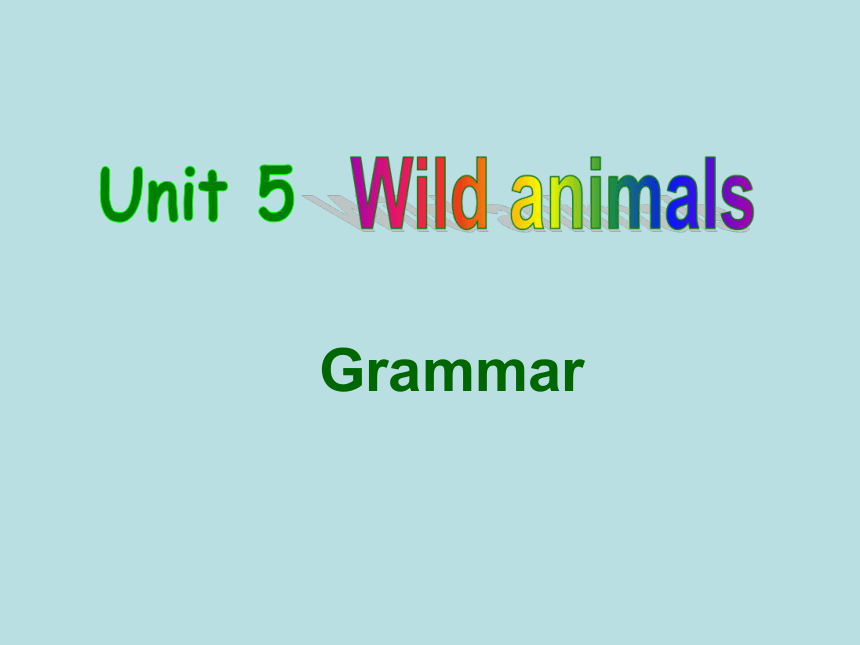
|
|
| 格式 | zip | ||
| 文件大小 | 1.1MB | ||
| 资源类型 | 教案 | ||
| 版本资源 | 牛津译林版 | ||
| 科目 | 英语 | ||
| 更新时间 | 2020-07-27 00:00:00 | ||
图片预览


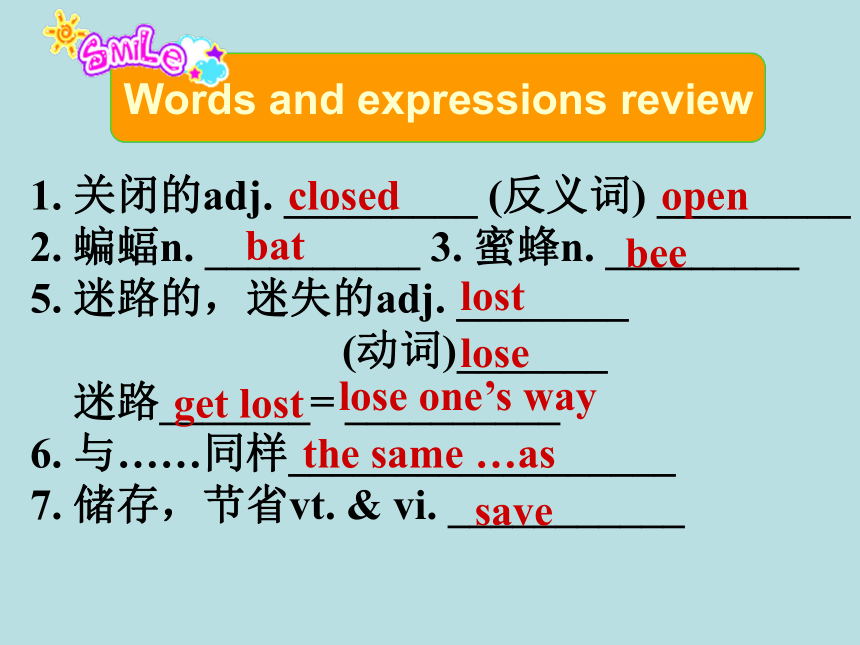
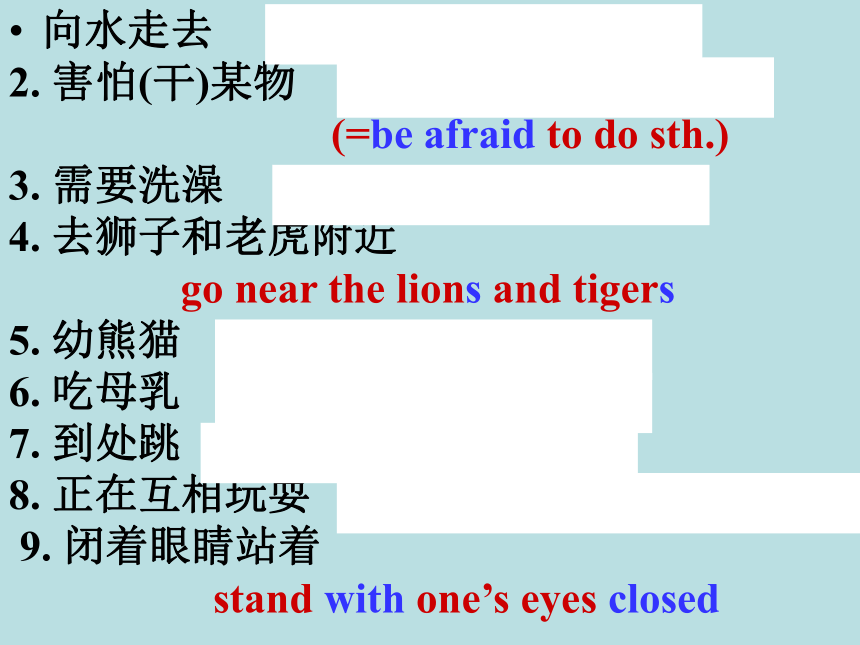
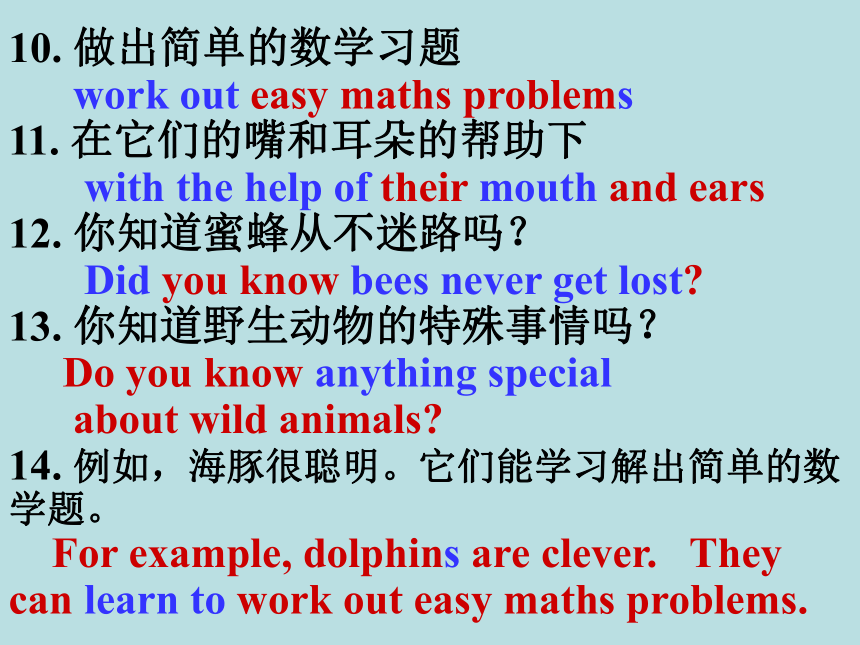
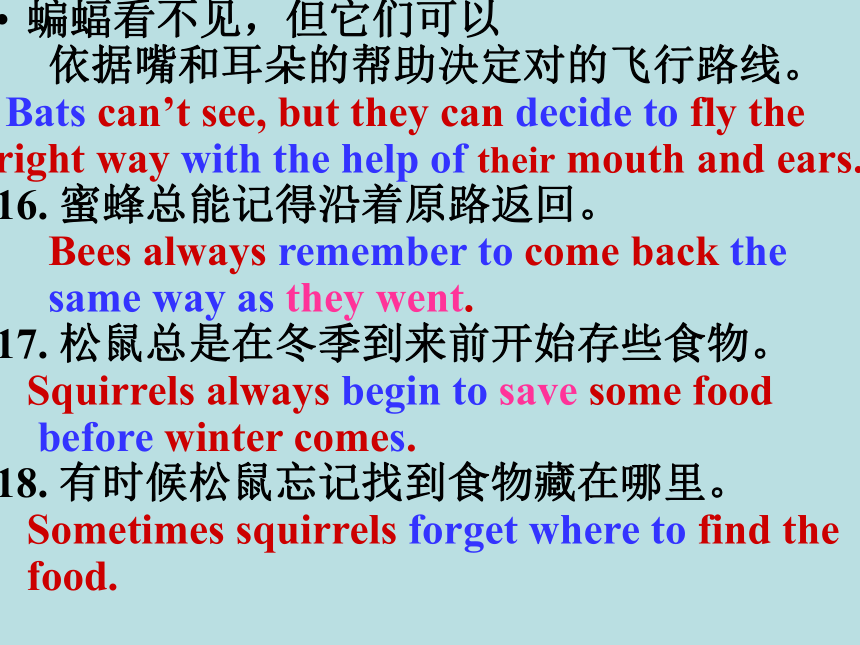
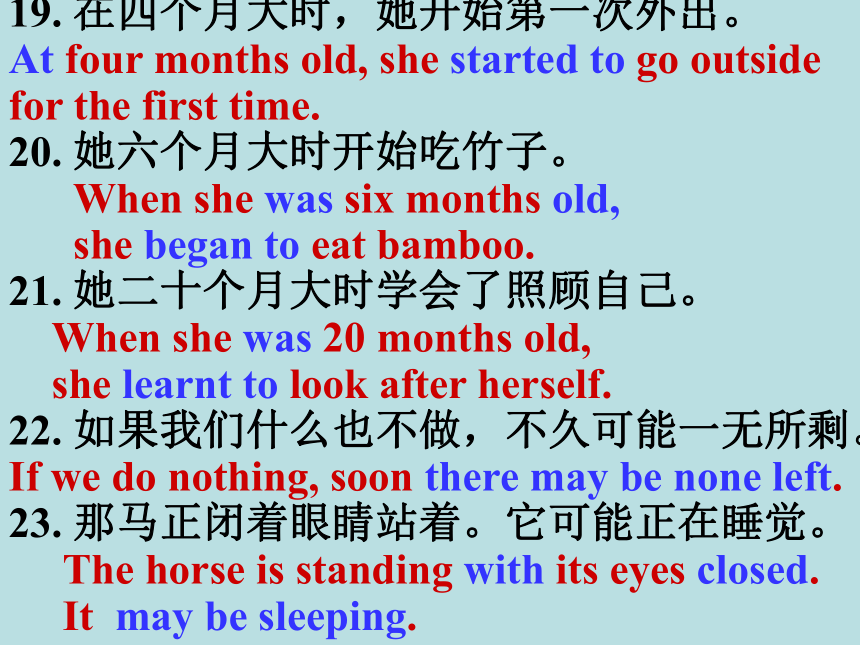


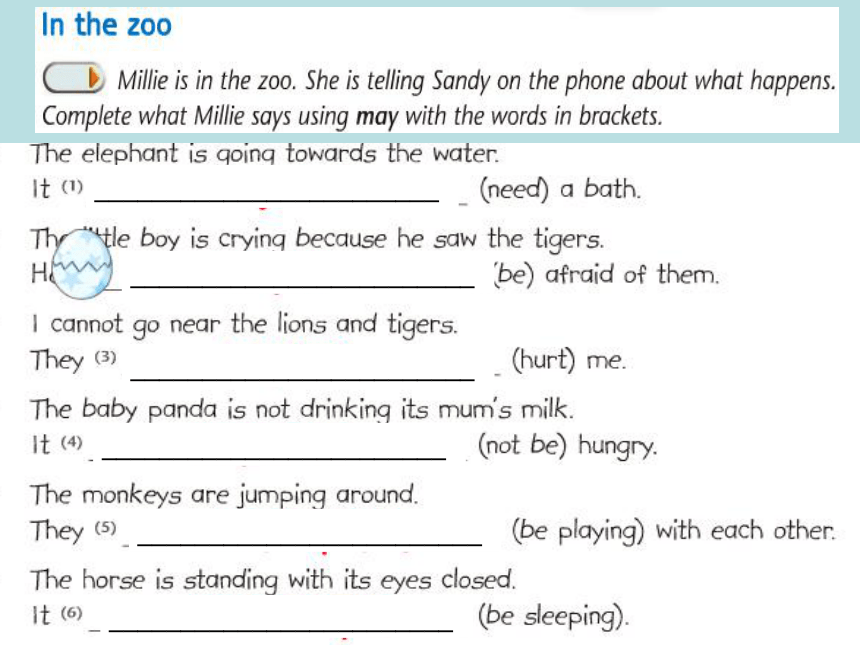

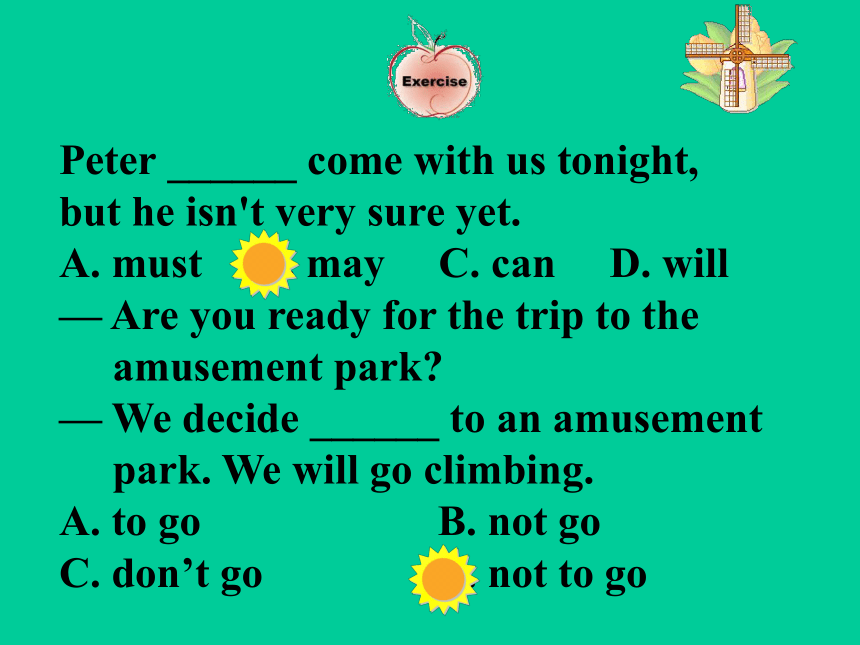
文档简介
(共36张PPT)
Grammar
To
learn
to
use
may
for
possibility
To
learn
to
use
verbs
+
to-infinitives
1.
关闭的adj.
_________
(反义词)
_________
2.
蝙蝠n.
__________
3.
蜜蜂n.
_________
5.
迷路的,迷失的adj.
________
(动词)_______
迷路_______=
__________
6.
与……同样__________________
7.
储存,节省vt.
&
vi.
___________
closed
open
bat
bee
lost
lose
get
lost
lose
one’s
way
the
same
…as
save
向水走去
go
towards
the
water
2.
害怕(干)某物
be
afraid
of
(doing)sth.
(=be
afraid
to
do
sth.)
3.
需要洗澡
need
(to
have)
a
bath
4.
去狮子和老虎附近
go
near
the
lions
and
tigers
5.
幼熊猫
the
baby
panda
6.
吃母乳
drink
its
mum’s
milk
7.
到处跳
jump
around
8.
正在互相玩耍
be
playing
with
each
other
9.
闭着眼睛站着
stand
with
one’s
eyes
closed
10.
做出简单的数学习题
work
out
easy
maths
problems
11.
在它们的嘴和耳朵的帮助下
with
the
help
of
their
mouth
and
ears
12.
你知道蜜蜂从不迷路吗?
Did
you
know
bees
never
get
lost?
13.
你知道野生动物的特殊事情吗?
Do
you
know
anything
special
about
wild
animals?
14.
例如,海豚很聪明。它们能学习解出简单的数学题。
For
example,
dolphins
are
clever.
They
can
learn
to
work
out
easy
maths
problems.
蝙蝠看不见,但它们可以
依据嘴和耳朵的帮助决定对的飞行路线。
Bats
can’t
see,
but
they
can
decide
to
fly
the
right
way
with
the
help
of
their
mouth
and
ears.
16.
蜜蜂总能记得沿着原路返回。
Bees
always
remember
to
come
back
the
same
way
as
they
went.
17.
松鼠总是在冬季到来前开始存些食物。
Squirrels
always
begin
to
save
some
food
before
winter
comes.
18.
有时候松鼠忘记找到食物藏在哪里。Sometimes
squirrels
forget
where
to
find
the
food.
19.
在四个月大时,她开始第一次外出。
At
four
months
old,
she
started
to
go
outside
for
the
first
time.
20.
她六个月大时开始吃竹子。
When
she
was
six
months
old,
she
began
to
eat
bamboo.
21.
她二十个月大时学会了照顾自己。
When
she
was
20
months
old,
she
learnt
to
look
after
herself.
22.
如果我们什么也不做,不久可能一无所剩。
If
we
do
nothing,
soon
there
may
be
none
left.
23.
那马正闭着眼睛站着。它可能正在睡觉。
The
horse
is
standing
with
its
eyes
closed.
It
may
be
sleeping.
Revise
and
complete
the
following
sentences.
1.
I
____
die
without
them.
2.
As
a
result,
pandas
________
have
a
place
to
live
or
food
to
eat.
3.
If
we
do
nothing,
soon
there
____
be
none
left!
may
may
not
may
________________________
________________________
________________________
________________________
________________________
________________________
may可用来表示猜测某件事发生的
可
能
性,常译为“也许,可能”。may通常用于肯定句
与否定句,相当于_________
________
或
________.
一般不用于疑问句。例如:
你可能是对的。
You
____
___
right.
=
_____
you
____
right.
这消息也许是真的,也许不是真的。
The
news
may
or
may
not
be
true.
此刻她可能正在和同学们玩.
At
the
moment
she
may
be
playing
with
her
classmates.
他出差了,可能不会来参加今晚的聚会。
She
is
away
_____
_________.
He
_____
_______
______
to
the
party
this
evening.
____
___
___
___
___
___
possibly
perhaps
maybe
____
____
____
may
be
Maybe
are
____
___
______
on
business
may
not
come
Peter?______
come?with?us?tonight,?
but?he?isn't?very?sure?yet.
A.?must??
B.?may?
C.?can
D.?will
—
Are
you
ready
for
the
trip
to
the
amusement
park?
—
We
decide
______
to
an
amusement
park.
We
will
go
climbing.
A.
to
go
B.
not
go
C.
don’t
go
D.
not
to
go
当我们要表示“想做某事、需要做某事
或决定做某事”时,就会出现两个动词
连用的情况,这时应如何表达呢?
同学们自然会想到want
to
do
sth.,
need
to
do
sth.和decide
to
do
sth.
等表达方式。
Using
verbs
+
to-infinitives
Kitty
is
preparing
to
go
out
next
Sunday.
Kitty
plans
to
take
Linda
out.
Linda
wanted
to
visit
the
park.
Sandy
agrees
to
go
with
them.
Millie
decided
to
stay
at
home.
Please
go
on
to
look
at
the
sentences
below.
Pay
attention
to
the
colored
words.
上面例子中主要行为动词后面的动词
都采用了“to
+
动词原形”的结构,我
们把这种结构称为动词不定式(有时
可以不带to)。动词不定式没有人称
和数的变化,在句子中不能单独作谓
语,其否定形式是“not
to
+
动词原形”。
什么是动词不定式(‘to-infinitives’)?
1.
At
four
months
old,
she
weighed
about
eight
kilograms
and
____________
outside
for
the
first
time.
2.
When
she
was
six
months
old,
she
___________
bamboo.
3.
When
she
was
20
months
old,
she
____________
after
herself.
started
to
go
began
to
eat
learnt
to
look
__________________
_________________
_________________
_________________
1)动词不定式作宾语
后面能接不定式作宾语的动词有很多,如agree,
ask,
choose,
decide,
forget,
remember,
hope,
learn,
want,
wish,
would
like,
prepare,
fail,
start,
begin,
plan,
try,
seem,
promise,refuse等。
e.g.
We
hope
to
get
there
before
dark.
我们希望天黑以前到那儿。
The
girl
decided
to
do
it
herself.
那个姑娘决定自己做那件事。
______
____
2)
有些动词跟不定式与
跟动名词作宾语含义不同:
记住要做某事
remember
to
do
sth
;
记得曾经做过某事remember
doing
sth
忘记要做某事
forget
to
do
sth
忘记曾经做过某事forget
doing
sth
停下来去做某事
stop
to
do
sth
停止做某事
stop
doing
sth
继续做另一件事
go
on
to
do
sth
继续做原来在做的事go
on
doing
sth
我记得以前在哪儿见过你。
I
remember
seeing
you
somewhere
before.
离开时请记得关灯。
Please
remember
to
turn
off
the
light
when
you
leave.
________
________
_________
_______
3.动词不定式的否定形式
动词不定式的否定式是在to前加not;不带to的不定式则在动词前加not。如:
张明要我不要整天呆在家里。Zhang
Ming
asked
me
not
to
stay
at
home
all
day.
妈妈让我不要独自做这件事。
My
mother
let
me
not
do
it
by
myself.
_________________
_____
__
_____
1.
当我们猜测某件事发生的可能性时,常
用may来表示“也许”、“可能”。
2.
当句子中已经有谓语动词,而我们又要
表达不止一个动作概念时,其余的动词
可以使用非谓语形式表达。动词不定式
就是动词的一种非谓语形式,其肯定形
式是“to
+
动词原形”,其否定形式是
“not
to
+
动词原形”。无人称、数和时态
的变化。
1.
—
Don’t
forget
______
your
homework,
John.
—
Ok,
I’ll
do
it
right
now.
A.
doing
B.
do
C.
to
doing
D.
to
do
2.
—
Have
you
decided
which
senior
high
school
to
choose?
—
Not
yet.
I
______
go
to
Moonlight
School.
A.
must
B.
may
C.
need
D.
should
I.
单项选择。
3.
—
Excuse
me,
when
are
we
going
to
have
a
picnic?
—
I’m
not
sure,
Ask
our
monitor,
please.
He
______
know.
A.
need
B.
can
C.
may
D.
shall
4.
—
Do
you
have
any
plans
for
this
weekend?
—
I'm
not
sure.
I
______
go
climbing
Mount
Yuntai.
A.
must
B.
need
C.
may
D.
can
5.
—
Is
Jim
coming
by
train?
—
I’m
not
sure.
He
______
drive
his
car.
A.
must
B.
may
C.
need
6.
Drivers
shouldn't
be
allowed
______
after
drinking,
or
they
will
break
the
law.
A.
drive
B.
driving
C.
to
drive
D.
to
be
driven
to
learn
to
do
to
take
work
to
come
1.
What
are
you
going
to
choose
______
(do)?
用所给词的适当形式填空
4.
Mr
Green’s
planning
_______
(take)
his
students
to
go
on
an
outing.
3.
We
can
go
horse
________
(ride)
in
Inner
Mongolia.
2.
Simon
decided
________
(learn)
Maths
by
himself.
5.
The
boss
makes
his
workers
_______
(work)
for
over
eight
hours
a
day.
6.
He
is
always
the
first
_______(come)
to
school.
riding
三.
完成句子。
1.
他可能认识你。
He
_________
you.
2.
他们可能下周去长城。
They
_________
the
Great
Wall
next
week.
3.
我们同意马上离开。
We
agreed
________
at
once.
4.
Laura计划到中国一些名胜之地旅游。
Laura
____________
some
places
of
interest
in
China.
5.
你愿意和他一起工作吗?
Would
you
_____________
with
him?
like
to
work
plans
to
visit
to
leave
may
know
may
go
to
关闭的adj.
_________
(反义词)
_________
2.
蝙蝠n.
__________
3.
蜜蜂n.
_________
5.
迷路的,迷失的adj.
________
(动词)_______
迷路_______=
__________
6.
与……同样__________________
7.
储存,节省vt.
&
vi.
___________
向水走去
2.
害怕(干)某物
(2)
3.
需要洗澡
4.
去狮子和老虎附近
5.
幼熊猫
6.
吃母乳
7.
到处跳
8.
正在互相玩耍
9.
闭着眼睛站着
10.
做出简单的数学习题
11.
在它们的嘴和耳朵的帮助下
12.
你知道蜜蜂从不迷路吗?
13.
你知道野生动物的特殊事情吗?
14.
例如,海豚很聪明。它们能学习解出简单的数学题。
蝙蝠看不见,但它们可以
依据嘴和耳朵的帮助决定对的飞行路线。
16.
蜜蜂总能记得沿着原路返回。
17.
松鼠总是在冬季到来前开始存些食物。
18.
有时候松鼠忘记找到食物藏在哪里。
19.
在四个月大时,她开始第一次外出。
20.
她六个月大时开始吃竹子。
21.
她二十个月大时学会了照顾自己。
22.
如果我们什么也不做,不久可能一无
所剩。
23.
那马正闭着眼睛站着。它可能正在睡
觉。
To
preview
Integrated
skills
on
Pages
63
and
64
2.
To
learn
to
talk
about
how
to
protect
wild
animals
1.
Review
the
Grammar
and
make
some
sentences
with
may
and
verbs
+
to-infinitives.
2.
Finish
the
Exercises
on
Pages
61
and
62.
Homework
Grammar
To
learn
to
use
may
for
possibility
To
learn
to
use
verbs
+
to-infinitives
1.
关闭的adj.
_________
(反义词)
_________
2.
蝙蝠n.
__________
3.
蜜蜂n.
_________
5.
迷路的,迷失的adj.
________
(动词)_______
迷路_______=
__________
6.
与……同样__________________
7.
储存,节省vt.
&
vi.
___________
closed
open
bat
bee
lost
lose
get
lost
lose
one’s
way
the
same
…as
save
向水走去
go
towards
the
water
2.
害怕(干)某物
be
afraid
of
(doing)sth.
(=be
afraid
to
do
sth.)
3.
需要洗澡
need
(to
have)
a
bath
4.
去狮子和老虎附近
go
near
the
lions
and
tigers
5.
幼熊猫
the
baby
panda
6.
吃母乳
drink
its
mum’s
milk
7.
到处跳
jump
around
8.
正在互相玩耍
be
playing
with
each
other
9.
闭着眼睛站着
stand
with
one’s
eyes
closed
10.
做出简单的数学习题
work
out
easy
maths
problems
11.
在它们的嘴和耳朵的帮助下
with
the
help
of
their
mouth
and
ears
12.
你知道蜜蜂从不迷路吗?
Did
you
know
bees
never
get
lost?
13.
你知道野生动物的特殊事情吗?
Do
you
know
anything
special
about
wild
animals?
14.
例如,海豚很聪明。它们能学习解出简单的数学题。
For
example,
dolphins
are
clever.
They
can
learn
to
work
out
easy
maths
problems.
蝙蝠看不见,但它们可以
依据嘴和耳朵的帮助决定对的飞行路线。
Bats
can’t
see,
but
they
can
decide
to
fly
the
right
way
with
the
help
of
their
mouth
and
ears.
16.
蜜蜂总能记得沿着原路返回。
Bees
always
remember
to
come
back
the
same
way
as
they
went.
17.
松鼠总是在冬季到来前开始存些食物。
Squirrels
always
begin
to
save
some
food
before
winter
comes.
18.
有时候松鼠忘记找到食物藏在哪里。Sometimes
squirrels
forget
where
to
find
the
food.
19.
在四个月大时,她开始第一次外出。
At
four
months
old,
she
started
to
go
outside
for
the
first
time.
20.
她六个月大时开始吃竹子。
When
she
was
six
months
old,
she
began
to
eat
bamboo.
21.
她二十个月大时学会了照顾自己。
When
she
was
20
months
old,
she
learnt
to
look
after
herself.
22.
如果我们什么也不做,不久可能一无所剩。
If
we
do
nothing,
soon
there
may
be
none
left.
23.
那马正闭着眼睛站着。它可能正在睡觉。
The
horse
is
standing
with
its
eyes
closed.
It
may
be
sleeping.
Revise
and
complete
the
following
sentences.
1.
I
____
die
without
them.
2.
As
a
result,
pandas
________
have
a
place
to
live
or
food
to
eat.
3.
If
we
do
nothing,
soon
there
____
be
none
left!
may
may
not
may
________________________
________________________
________________________
________________________
________________________
________________________
may可用来表示猜测某件事发生的
可
能
性,常译为“也许,可能”。may通常用于肯定句
与否定句,相当于_________
________
或
________.
一般不用于疑问句。例如:
你可能是对的。
You
____
___
right.
=
_____
you
____
right.
这消息也许是真的,也许不是真的。
The
news
may
or
may
not
be
true.
此刻她可能正在和同学们玩.
At
the
moment
she
may
be
playing
with
her
classmates.
他出差了,可能不会来参加今晚的聚会。
She
is
away
_____
_________.
He
_____
_______
______
to
the
party
this
evening.
____
___
___
___
___
___
possibly
perhaps
maybe
____
____
____
may
be
Maybe
are
____
___
______
on
business
may
not
come
Peter?______
come?with?us?tonight,?
but?he?isn't?very?sure?yet.
A.?must??
B.?may?
C.?can
D.?will
—
Are
you
ready
for
the
trip
to
the
amusement
park?
—
We
decide
______
to
an
amusement
park.
We
will
go
climbing.
A.
to
go
B.
not
go
C.
don’t
go
D.
not
to
go
当我们要表示“想做某事、需要做某事
或决定做某事”时,就会出现两个动词
连用的情况,这时应如何表达呢?
同学们自然会想到want
to
do
sth.,
need
to
do
sth.和decide
to
do
sth.
等表达方式。
Using
verbs
+
to-infinitives
Kitty
is
preparing
to
go
out
next
Sunday.
Kitty
plans
to
take
Linda
out.
Linda
wanted
to
visit
the
park.
Sandy
agrees
to
go
with
them.
Millie
decided
to
stay
at
home.
Please
go
on
to
look
at
the
sentences
below.
Pay
attention
to
the
colored
words.
上面例子中主要行为动词后面的动词
都采用了“to
+
动词原形”的结构,我
们把这种结构称为动词不定式(有时
可以不带to)。动词不定式没有人称
和数的变化,在句子中不能单独作谓
语,其否定形式是“not
to
+
动词原形”。
什么是动词不定式(‘to-infinitives’)?
1.
At
four
months
old,
she
weighed
about
eight
kilograms
and
____________
outside
for
the
first
time.
2.
When
she
was
six
months
old,
she
___________
bamboo.
3.
When
she
was
20
months
old,
she
____________
after
herself.
started
to
go
began
to
eat
learnt
to
look
__________________
_________________
_________________
_________________
1)动词不定式作宾语
后面能接不定式作宾语的动词有很多,如agree,
ask,
choose,
decide,
forget,
remember,
hope,
learn,
want,
wish,
would
like,
prepare,
fail,
start,
begin,
plan,
try,
seem,
promise,refuse等。
e.g.
We
hope
to
get
there
before
dark.
我们希望天黑以前到那儿。
The
girl
decided
to
do
it
herself.
那个姑娘决定自己做那件事。
______
____
2)
有些动词跟不定式与
跟动名词作宾语含义不同:
记住要做某事
remember
to
do
sth
;
记得曾经做过某事remember
doing
sth
忘记要做某事
forget
to
do
sth
忘记曾经做过某事forget
doing
sth
停下来去做某事
stop
to
do
sth
停止做某事
stop
doing
sth
继续做另一件事
go
on
to
do
sth
继续做原来在做的事go
on
doing
sth
我记得以前在哪儿见过你。
I
remember
seeing
you
somewhere
before.
离开时请记得关灯。
Please
remember
to
turn
off
the
light
when
you
leave.
________
________
_________
_______
3.动词不定式的否定形式
动词不定式的否定式是在to前加not;不带to的不定式则在动词前加not。如:
张明要我不要整天呆在家里。Zhang
Ming
asked
me
not
to
stay
at
home
all
day.
妈妈让我不要独自做这件事。
My
mother
let
me
not
do
it
by
myself.
_________________
_____
__
_____
1.
当我们猜测某件事发生的可能性时,常
用may来表示“也许”、“可能”。
2.
当句子中已经有谓语动词,而我们又要
表达不止一个动作概念时,其余的动词
可以使用非谓语形式表达。动词不定式
就是动词的一种非谓语形式,其肯定形
式是“to
+
动词原形”,其否定形式是
“not
to
+
动词原形”。无人称、数和时态
的变化。
1.
—
Don’t
forget
______
your
homework,
John.
—
Ok,
I’ll
do
it
right
now.
A.
doing
B.
do
C.
to
doing
D.
to
do
2.
—
Have
you
decided
which
senior
high
school
to
choose?
—
Not
yet.
I
______
go
to
Moonlight
School.
A.
must
B.
may
C.
need
D.
should
I.
单项选择。
3.
—
Excuse
me,
when
are
we
going
to
have
a
picnic?
—
I’m
not
sure,
Ask
our
monitor,
please.
He
______
know.
A.
need
B.
can
C.
may
D.
shall
4.
—
Do
you
have
any
plans
for
this
weekend?
—
I'm
not
sure.
I
______
go
climbing
Mount
Yuntai.
A.
must
B.
need
C.
may
D.
can
5.
—
Is
Jim
coming
by
train?
—
I’m
not
sure.
He
______
drive
his
car.
A.
must
B.
may
C.
need
6.
Drivers
shouldn't
be
allowed
______
after
drinking,
or
they
will
break
the
law.
A.
drive
B.
driving
C.
to
drive
D.
to
be
driven
to
learn
to
do
to
take
work
to
come
1.
What
are
you
going
to
choose
______
(do)?
用所给词的适当形式填空
4.
Mr
Green’s
planning
_______
(take)
his
students
to
go
on
an
outing.
3.
We
can
go
horse
________
(ride)
in
Inner
Mongolia.
2.
Simon
decided
________
(learn)
Maths
by
himself.
5.
The
boss
makes
his
workers
_______
(work)
for
over
eight
hours
a
day.
6.
He
is
always
the
first
_______(come)
to
school.
riding
三.
完成句子。
1.
他可能认识你。
He
_________
you.
2.
他们可能下周去长城。
They
_________
the
Great
Wall
next
week.
3.
我们同意马上离开。
We
agreed
________
at
once.
4.
Laura计划到中国一些名胜之地旅游。
Laura
____________
some
places
of
interest
in
China.
5.
你愿意和他一起工作吗?
Would
you
_____________
with
him?
like
to
work
plans
to
visit
to
leave
may
know
may
go
to
关闭的adj.
_________
(反义词)
_________
2.
蝙蝠n.
__________
3.
蜜蜂n.
_________
5.
迷路的,迷失的adj.
________
(动词)_______
迷路_______=
__________
6.
与……同样__________________
7.
储存,节省vt.
&
vi.
___________
向水走去
2.
害怕(干)某物
(2)
3.
需要洗澡
4.
去狮子和老虎附近
5.
幼熊猫
6.
吃母乳
7.
到处跳
8.
正在互相玩耍
9.
闭着眼睛站着
10.
做出简单的数学习题
11.
在它们的嘴和耳朵的帮助下
12.
你知道蜜蜂从不迷路吗?
13.
你知道野生动物的特殊事情吗?
14.
例如,海豚很聪明。它们能学习解出简单的数学题。
蝙蝠看不见,但它们可以
依据嘴和耳朵的帮助决定对的飞行路线。
16.
蜜蜂总能记得沿着原路返回。
17.
松鼠总是在冬季到来前开始存些食物。
18.
有时候松鼠忘记找到食物藏在哪里。
19.
在四个月大时,她开始第一次外出。
20.
她六个月大时开始吃竹子。
21.
她二十个月大时学会了照顾自己。
22.
如果我们什么也不做,不久可能一无
所剩。
23.
那马正闭着眼睛站着。它可能正在睡
觉。
To
preview
Integrated
skills
on
Pages
63
and
64
2.
To
learn
to
talk
about
how
to
protect
wild
animals
1.
Review
the
Grammar
and
make
some
sentences
with
may
and
verbs
+
to-infinitives.
2.
Finish
the
Exercises
on
Pages
61
and
62.
Homework
